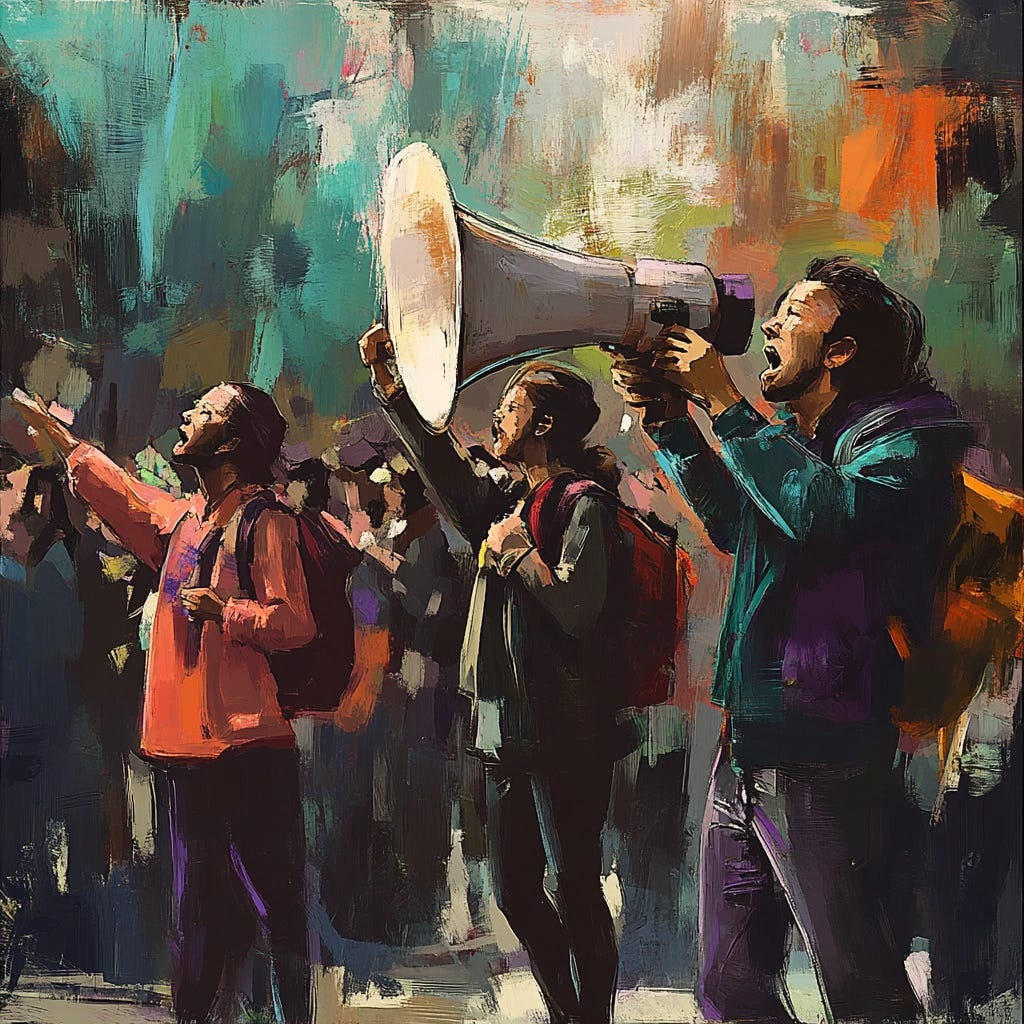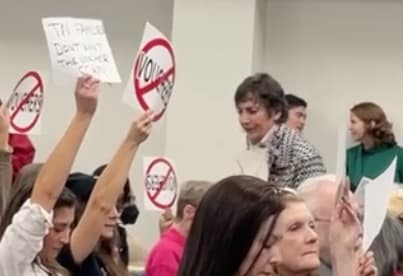The Left’s War on Debate: When Emotion Replaces Argument
Activism without argument is just performance
Protest Culture and the Decline of Rational Debate
Chants of “No justice, no peace” rang through the chamber as the special committee debated the issue of school choice in Nashville. The measure ultimately passed, but not before disruptions from dissenting members of the teachers' union and the NAACP. At least one lady was escorted out.
A woman sitting in front of my group spent a fair part of two hours shooting us disapproving side-eye, even when our whispered comments acknowledged arguments favoring her position and even when we were perfectly silent.
What struck me most was not the passion of those opposed to school choice but the complete absence of rational argument. Instead of presenting values braced for strong debate with evidence, the supporting audience indulged in angry invective and slogans, while those of us in favor of the bill maintained a quiet respect for the proceedings. We even discussed that ahead of time so we could be emotionally prepared.
Given the dirty looks and strident chanting, it was uncomfortably oppressive and had an air of attempted bullying.
Had the opposition had the power, I suspect they would have shut down discussion altogether. Though they might report, that’s what happened to them when a frustrated committee member called for the group to go back into session, thus ending the period of questioning and forcing a vote that they lost.
During the session, an 18-year-old speaker was brought forward to argue against school choice. He claimed that it would take money from public schools and that $50,000 a year was not a livable wage for teachers. While I admired his courage, he was unprepared for the representatives’ questions.
For several salient points, he didn’t have specific data and was clearly working from assumptions.
When challenged, he quickly abandoned argumentation in favor of disruption. He shouted over the proceedings and resorted to insult until he was warned he would be removed if he didn’t engage respectfully.
After the bill passed, I noticed the local media interviewing him while completely ignoring the many who had spoken in favor of school choice. It was clear that the spectacle—not the substance—was what they found most compelling. Though it’s fair to suspect they agree with that point of view as well.
This entire event had the air of Kabuki theater, a carefully orchestrated performance meant to provoke fear rather than explore solutions. At one point, a man opposed to school choice paraded a sign reading, “How about when 85% of schools are Islamic?”—an obvious attempt to stir racial anxieties. Though the statement failed to land, its presence showed his hand. His intent was to poison the atmosphere, shifting the conversation from debate to outrage.
It’s troubling to see how deeply emotion has overtaken reason in modern political discourse. The left, once home to intellectual heavyweights who championed debate and free thought, has increasingly substituted protest for substance. I don’t say this as an insult—I say it as a genuine concern.
The Rise of Protest Culture
Since the 1960s, protest has been a powerful tool for social change. The civil rights movement, the Vietnam War protests—these were necessary disruptions that forced the nation to confront injustice. Protest has its place. It always has.
But what happens when protest becomes the default response to every political disagreement? When disagreement itself is treated as an act of oppression? When the mere act of debating an issue is met with screaming, walkouts, and threats?
We are living in the age of protest culture, where brandishing anger has become more important than presenting a coherent argument. The message is no longer “Here is why we are right,” but “How dare you question us?”
The result? A culture that values outrage over solutions. But our recent election argues that is changing.
The Consequences of Abandoning Debate
Political discourse built on protest rather than first principles cannot sustain itself. Sooner or later people see through the manipulation and find the courage to stand up to the bullying. We are already seeing the cracks in real-time.
The Democratic Party, once a coalition of diverse ideas, is fracturing under the weight of its own contradictions. Identity politics has turned its members against one another, competing for moral high ground rather than uniting behind shared principles. The rise of illiberal left-wing authoritarianism—speech codes, ideological purges, and mob outrage—has alienated centrists and pushed many toward independent or conservative alternatives.
Protest culture thrives on emotional highs as members indulge in self-righteous chest pounding, but emotions fade. Without rational argument, without agreed-upon values and principles, the left is in freefall.
Rebuilding Trust Through Debate
If the political left hopes to rebuild, it must rediscover its values and engage in rational debate. Protest alone cannot sustain a movement. Emotion may ignite passion, but reason is what builds lasting change and real progress.
It is time to reconsider the role of protest in public discourse. Not to eliminate it—protest will always have its place—but to restore balance.
Disrupting a hearing may get attention. Chanting slogans may feel powerful. It might even scare some folks off for a while, but not forever. When that happens, the currency of progress is truth.
The real work of governance happens in the space where ideas based on coherent values are exchanged, challenged, and refined.
A movement that cannot articulate its own arguments without resorting to spectacle will not last. It will burn bright, and then it will burn out.
In a world where communism is recognized as the totalitarian nightmare that it is, the left needs to clarify its true values. Otherwise, it will continue screaming into the void while the world moves on without it.
And for the moment, we’ll be quiet about how this was teachers…
Housekeeping
I know Fridays are supposed to be more for fun, but with my trip to Nashville still fresh, I wanted to share my takeaway. I also didn’t want to disrupt presenting the findings of the textbook study with a tangent.
As recompense, here is a picture from one of my walks in late autumn.
These look a lot like cherry tomatoes except for the color (sort of), but I don’t know what they are. I only had time to take the picture, with no free moments to inspect for plant structure or collect samples. By the time I came back, they were gone. It is often that way with growing things.
Speaking of growing things, do you remember my plumeria that was blooming at the end of the summer? Well, when we had our first frost it was still in bud in the blooming cycle. I brought it inside, and while many clusters dropped off without opening, some have survived!
I did my best to tend it through the darkness, and the buds slept but did not fall. Then I noticed just a day or two ago that the remaining buds are growing again, and soon we will have blooms!
I’m super excited because 1) I didn’t think there was a chance in hell they’d over-winter and rebloom and 2) For the first January in a long time, my Sweet Pinky Love orchid did not bloom. I miss it.
I’m not surprised it didn’t bloom. In the early summer, I gave it a long overdue pruning of desiccated old stalks. I had hoped that since the remaining stalks grew well, I’d still have a January show, but I knew it was a necessary risk. I’ll hope for better next year.
As an additional plus, some of the keikis (baby orchid sprouts) that I separated have also made it through the winter. They are on their way to being fine new adult orchids. I just …uh… need to find somewhere to put them.
On the Bookshelf
For god’s sake, I’ve been traveling and sitting in centers of government. How am I supposed to read like this?! I am seriously trying to plan better. I was doing well when it was still warm enough to sit outside in the afternoon. Maybe it will improve with the sun. I don’t have a good reading area inside.
When I was younger, I read books all the time. (As opposed to listening to them which I do every day. I just still have to read the ones printed on paper.) Funny how that changes.
Help Keep This Conversation Going!
Share this post on social media–it costs nothing but helps a lot.
Want more perks? Subscribe to get full access to the article archive.
Become a Paid Subscriber to get video and chatroom.
Support from readers like you keeps this project alive!
Diogenes in Exile is reader-supported. If you find value in this work, please consider becoming a pledging/paid subscriber, donating to my GiveSendgo, or buying Thought Criminal merch. I’m putting everything on the line to bring this to you because I think it is just that important, but if you can, I need your help to keep this mission alive.
Already a Premium subscriber? Share your thoughts in the chat room.
About
Diogenes in Exile began after I returned to grad school to pursue a Clinical Mental Health Counseling master’s degree at the University of Tennessee. What I encountered, however, was a program deeply entrenched in Critical Theories ideology. During my time there, I experienced significant resistance, particularly for my Buddhist practice, which was labeled as invalidating to other identities. After careful reflection, I chose to leave the program, believing the curriculum being taught would ultimately harm clients and lead to unethical practices in the field.
Since then, I’ve dedicated myself to investigating, writing, and speaking out about the troubling direction of psychology, higher education, and other institutions that seem to have lost their way. When I’m not working on these issues, you’ll find me in the garden, creating art, walking my dog, or guiding my kids toward adulthood.
You can also find my work at Minding the Campus








